Guest Lecture on Engineering Thermodynamics
The Departments of Mechanical Engineering, Aeronautical Engineering and Aerospace Engineering organised a Guest Lecture on Engineering Thermodynamics, on 16th June 2023, at Dr. M V Jayaraman Auditorium, from 10.00 am to 12.30 pm. The Resource Speaker was Dr. Gantayata Gouda, Consultant IDST, CEMILAC, and Former Group Director - Propulsion Group, CEMILAC, DRDO, Bangalore. The Lecture was organized for 4th Semester students of Mechanical Engineering, Aeronautical Engineering and Aerospace Engineering. 36 students from 4th Semester ME, 64 from AE, and 39 from AS participated in the event, along with the faculty members from all the departments.
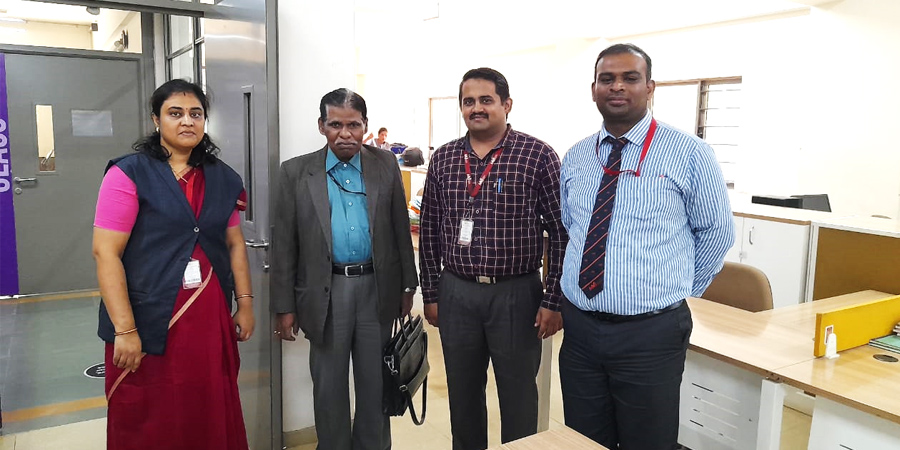 Faculty Members interacting with Dr. Gantayata Gouda about Research Proposals that can be submitted to DRDO and Other Agencies
Faculty Members interacting with Dr. Gantayata Gouda about Research Proposals that can be submitted to DRDO and Other Agencies Dr. Gantayata Gouda addressed the students, giving an overview of the thermodynamics behind Gas Turbine Engines. He highlighted the following points in his presentation:
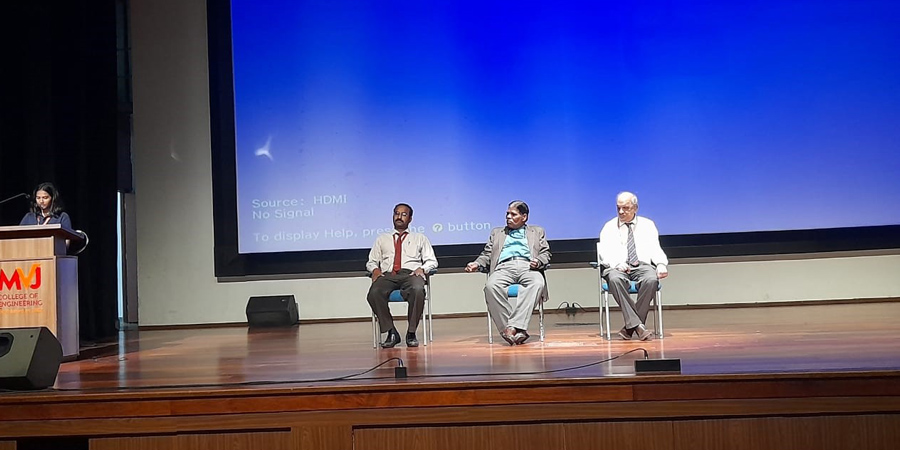 Introduction of Dr. Gantayata Gouda to the Participants
Introduction of Dr. Gantayata Gouda to the Participants - High-pressure Ratio Compression: Gas turbines are being designed with higher pressure ratios in the compressor section. This allows for increased efficiency, by compressing the air to higher pressures before combustion, resulting in improved thermodynamic performance.
- Advanced Combustion Systems: Researchers are exploring advanced combustion systems to improve the efficiency and reduce emissions of gas turbine engines. These include technologies such as lean premixed combustion, staged combustion, and low-emission combustors that optimize the fuel-air mixture for a cleaner and more efficient combustion.
- Combined Cycle Configurations: Gas turbine engines are increasingly integrated into combined cycle power plants, where waste heat from the gas turbine exhaust is utilized to generate additional power through steam turbines. This configuration improves overall efficiency, by utilizing the waste heat and achieving higher thermodynamic performance.
- Regenerative Cooling: Gas turbine components such as turbine blades, are subjected to high temperatures. To cool these components, regenerative cooling techniques are employed, where a portion of the compressed air is extracted before combustion, used for cooling, and then re-injected into the combustion process. This improves thermal efficiency, by reducing the cooling air requirements and maximizing energy extraction.
- Advanced Cooling Technologies: Various cooling techniques are being developed to enhance the cooling efficiency of gas turbine components. These include film cooling, thermal barrier coatings and internal cooling passages, which provide better cooling distribution, reduce component temperatures, and enhance the overall thermodynamic performance.
- Waste Heat Recovery: Efforts are being made to improve waste heat recovery from gas turbine exhaust gases. Advanced heat exchanger designs and thermodynamic cycles are being explored, to capture and utilize waste heat for various applications such as combined heat and power (CHP) systems or industrial processes, thereby increasing overall system efficiency.
- Advanced Control Systems: Gas turbine engines are incorporating advanced control systems that optimize the thermodynamic performance, under various operating conditions. These systems utilize real-time data, such as temperature, pressure and power output, to continuously adjust operating parameters, and improve the overall efficiency of the engine.
Dr. Gantayata Gouda suggested that as a Mechanical Engineer, one can choose from the wide range of career opportunities in the domain of Engineering Thermodynamics.
Dr. Gouda also explained about Gas Turbine engines and systems. Here are some aspects of gas turbine engines and systems that are relevant to advanced Engineering Thermodynamics:
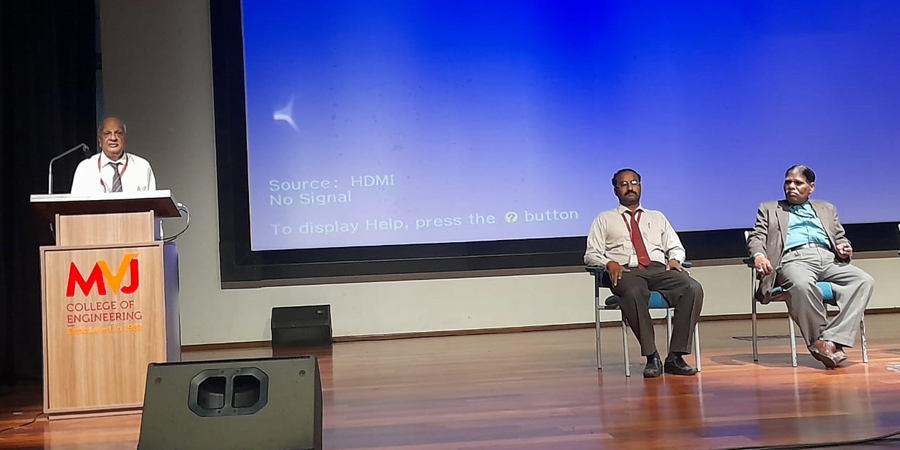 Prof. S C Gupta, HoD – AE and AS, inaugurating the Programme and highlighting the Importance of the Guest Lecture
Prof. S C Gupta, HoD – AE and AS, inaugurating the Programme and highlighting the Importance of the Guest Lecture - Brayton Cycle: Gas turbine engines operate on the Brayton cycle, which is a thermodynamic cycle that consists of a compressor, combustion chamber, turbine and exhaust. Understanding the principles of the Brayton cycle, including compression, combustion, expansion and heat rejection, is crucial in analysing the thermodynamic performance of gas turbines.
- Thermodynamic Efficiency: The thermodynamic efficiency of gas turbine engines is a critical aspect of their design and operation. Efficiency metrics such as thermal efficiency, overall efficiency, and specific fuel consumption are used to evaluate the performance of gas turbines. Advanced Engineering Thermodynamics involves studying methods to improve these efficiency parameters, through optimized designs, advanced materials and advanced control systems.
- Combustion and Emissions: The combustion process in gas turbine engines is another important thermodynamic aspect. Advanced Engineering Thermodynamics explores combustion efficiency, flame stability, and emissions reduction techniques. This includes lean premixed combustion, staged combustion, and alternative fuels to achieve higher combustion efficiency and lower pollutant emissions.
- Heat Transfer and Cooling: Heat transfer and cooling play a significant role in gas turbine systems. Efficient cooling of turbine blades and other hot components is essential for maintaining their structural integrity and improving overall performance. Advanced thermodynamic analysis includes the study of convective, conductive, and radiative heat transfer, as well as advanced cooling techniques such as film cooling and regenerative cooling.
- Component Design and Optimization: Advanced Engineering Thermodynamics involves the design and optimization of gas turbine components, for improved performance. This includes an aerodynamic design of compressor and turbine blades, thermal barrier coatings, material selection, and advanced manufacturing techniques such as additive manufacturing. Thermodynamic principles are applied, to optimize the performance of these components under various operating conditions.
- Combined Cycle Systems: Gas turbine engines are often integrated into combined cycle systems, where waste heat from the exhaust gases is recovered to generate additional power through steam turbines. Advanced Engineering Thermodynamics explores the thermodynamic analysis and optimization of combined cycle configurations, to maximize overall system efficiency.
- Laws of Thermodynamics: The foundation of Engineering Thermodynamics is based on the four laws of thermodynamics, which are fundamental principles governing energy and its transformations. These laws include the zeroth law (thermal equilibrium), the first law (conservation of energy), the second law (entropy and energy quality), and the third law (absolute zero and entropy).
- Thermodynamic Systems and Control Volumes: Engineering Thermodynamics involves studying thermodynamic systems and control volumes, which are defined regions or devices where energy interactions occur. Systems can be open, closed, or isolated, depending on the exchange of mass and energy with the surroundings. Control volumes are often used, to analyse mass and energy flows through a specific region of interest.
- Properties of Substances: The thermodynamic behaviour of substances is characterized by their properties, such as temperature, pressure, volume and specific internal energy. Engineering Thermodynamics focuses on understanding how these properties relate to each other, and how they change during thermodynamic processes.
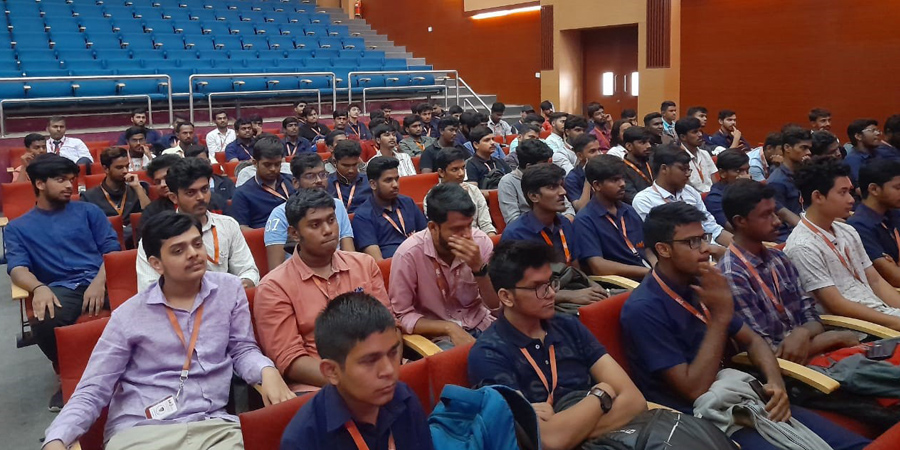 Students keenly listening to the Guest Lecture
Students keenly listening to the Guest Lecture The Lecture was well-appreciated by the students and faculty members of Mechanical, Aeronautical and Aerospace Engineering. The event concluded with vote of thanks by Dr. Santhosh N, Associate Professor, Department of Mechanical Engineering.
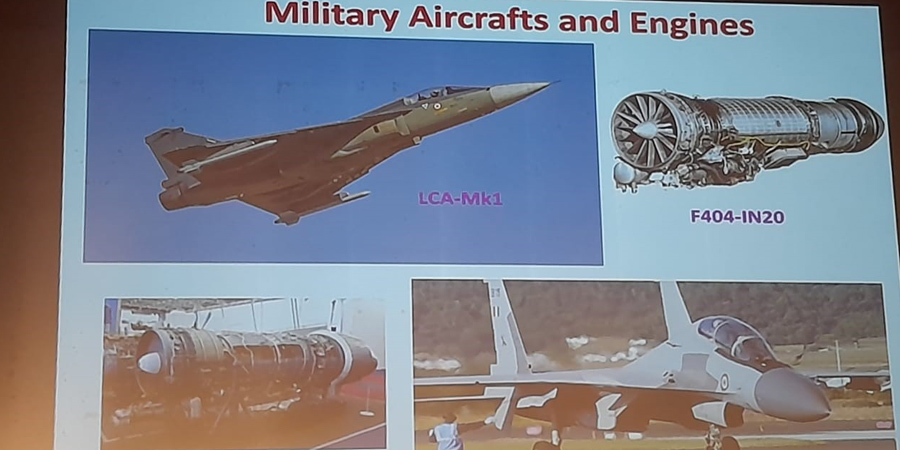 Dr. Gantayata Gouda describing about Military Aircrafts and Engines
Dr. Gantayata Gouda describing about Military Aircrafts and Engines 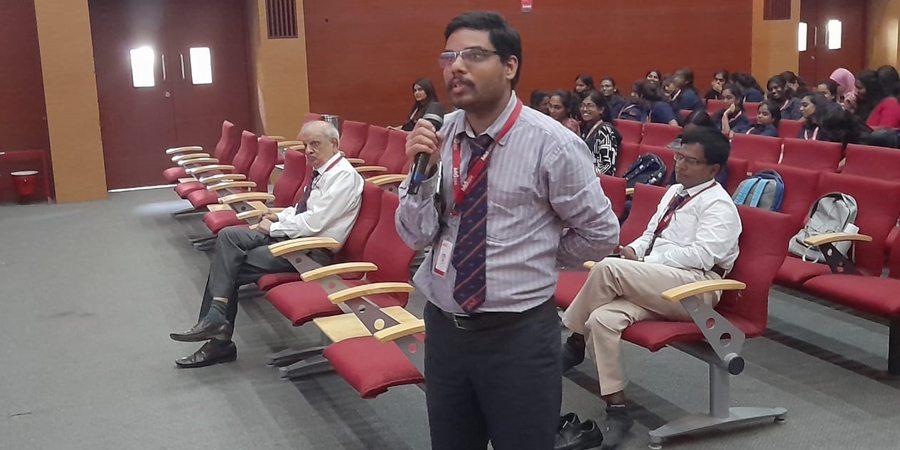 Dr. Shravan Kumar, Associate Professor, Department of Aeronautical Engineering, posing Questions to the Guest Speaker
Dr. Shravan Kumar, Associate Professor, Department of Aeronautical Engineering, posing Questions to the Guest Speaker 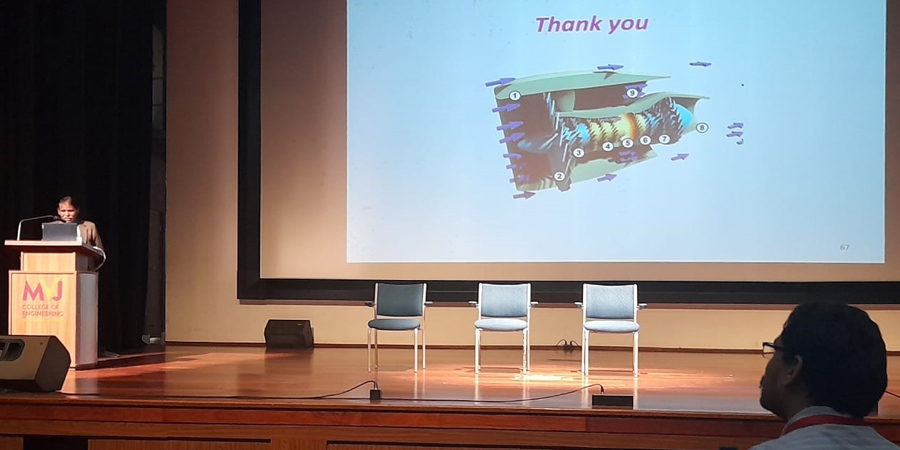 Dr. Gantayata Gouda addressing the Queries
Dr. Gantayata Gouda addressing the Queries Outcome of the Event
The event helped students and faculty members to
- Acquire knowledge about the basic skill required for Engineering Thermodynamics.
- Understand the practical aspects and importance of Engineering Thermodynamics.
- Apply the new knowledge related to Engineering Thermodynamics.
- Develop computational skills for solving problems on Engineering Thermodynamics.
- Imbibe critical thinking capabilities that is so important for Engineers.
- Understand more about Engineering Thermodynamics.
Discussions were held with the Resource Person about possible guidance for research in the field. Dr. Gantayata Gouda responded positively to the request, and assured that he would collaborate with both the departments for guiding faculty in research activities on Engineering Thermodynamics and Gas Turbine technology.





